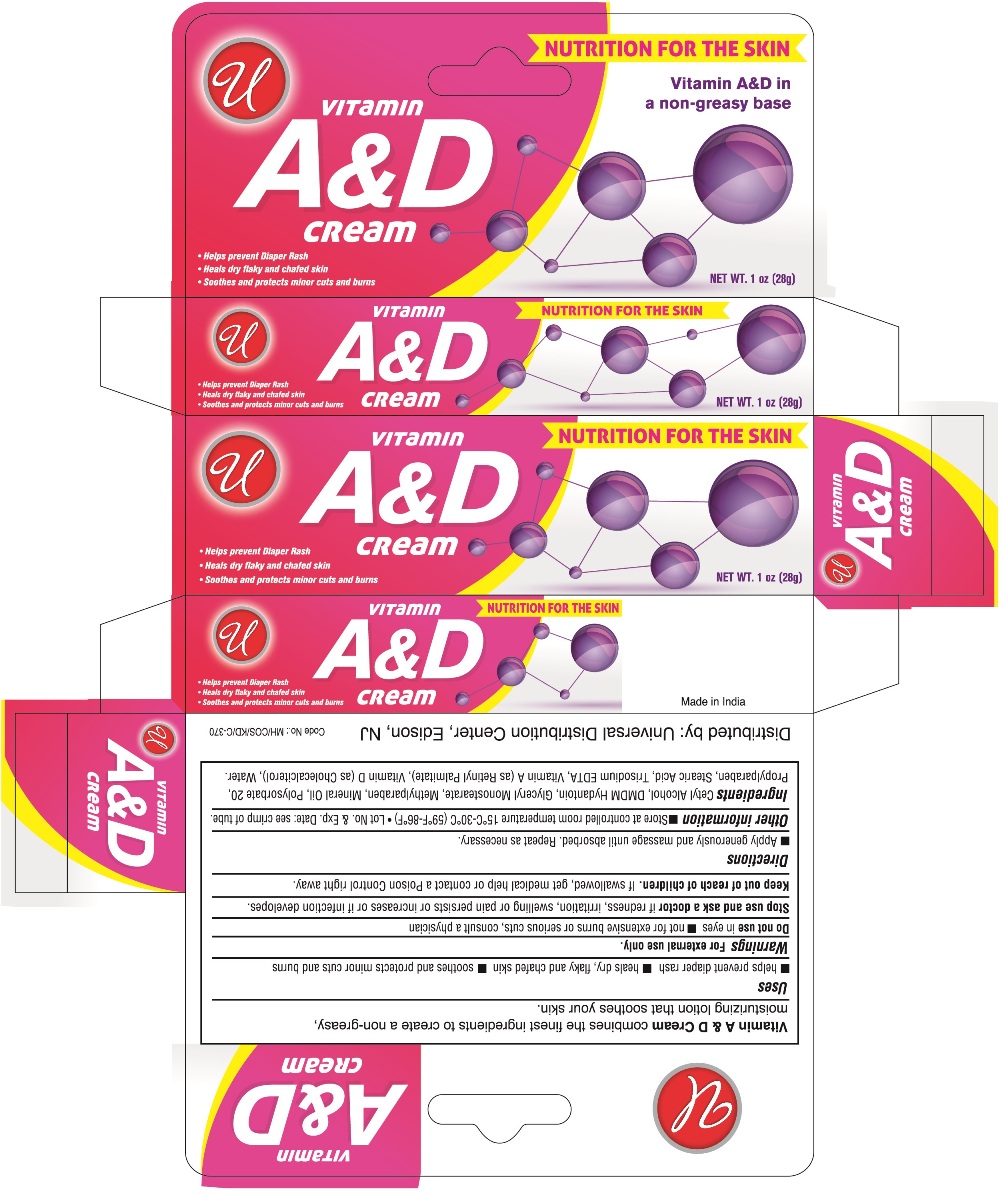Vitamin A And D Cream while Breastfeeding

What is Vitamin A And D Cream used for?
Brief: Skin protectant
Is Vitamin A And D Cream usage safe while breastfeeding? If a lactating mother is using it can there be any effect on growth or development of infant?

Vitamin A And D Cream Breastfeeding Analsys
Vitamin a while Breastfeeding
SafeCAS Number: 68-26-8
Retinol is also a name for vitamin A which is a natural component of human milk. Content in the human milk is about 2,800 IU/L (750 μ/L). Infant's recommended dietary daily allowance is 2,000 IU (600 μ/L). Mother's recommended daily allowance is 3,200 IU (950 μ/L). There is a risk for severe intoxication after an isolated dose of 25,000 IU or long-standing daily consumption of 5,000 IU. After a megadose administration of vitamin A increases concentration to a double in the colostrum. Supplementation with vitamin A to breastfeeding mothers or infants does not reduce mortality or morbidity among HIV affected offsprings, instead it increases the likelihood of transmission of HIV or subclinical mastitis in those mothers infected with HIV. Vitamin A is widely distributed in the food of animal or vegetable origin. Except for populations affected with food shortage or nutritionally deficient, those women on a complete and varied diet do not need the intake of vitamin A supplementation The List of Essential Medicines of WHO-2002 classifies it as compatible with breastfeeding.
Vitamin d while Breastfeeding
SafeCAS Number: 67-97-0
Daily allowance of Vitamin D for the breastfeeding woman is still an issue and a matter of disagreement among experts. Vitamin D is hardly found in common food and mostly synthesized by skin under sunlight stimulus. Low concentration in breast milk is thought to be due to deficient levels in the serum of mothers. As high as 6.400 IU daily doses of Vitamin D given to the mother have been required to normalize the infant serum content of 25-OH Vitamin D. Moderate exposure of mothers to sunlight, avoiding any burning, is probably the most cost-effective measure to fight Vitamin D deficiency in the infant. 1 mg = 40.000 IU.
Vitamin A And D Cream Breastfeeding Analsys - 2
Vitamin a while Breastfeeding
CAS Number: 68-26-8 79-81-2
Routine, modest daily supplemental vitamin A results in modest increases in milk vitamin A content and appears to be safe for the infant. Vitamin A (retinol) and provitamin A carotenoids are normal components of human milk.[1] The recommend dietary intake in lactating women is 1300 mcg retinol per day, compared to 770 mcg per day during pregnancy. The recommended daily intake for infants aged 6 months or less is 400 mcg. .[2] Lactating mothers may need to supplement their diet to achieve the recommended daily vitamin A intake. Maternal vitamin A supplementation during pregnancy and lactation has not been shown to reduce mortality or the risk of anemia in breastfed infants living in developing regions, but there may be undiscovered benefits related to improved antioxidant capacity and immune function.[3][4][5] Maternal single doses up to 120,000 mcg or daily doses up to 1500 mcg are not expected to harm the breastfed infant. Daily doses above 3,000 mcg should be avoided in the mother. [2] Vitamin A in milk has antioxidant properties.[6] Holder pasteurization (62.5 degrees C for 30 minutes) does not reduce milk antioxidant capacity.[7]
Vitamin d while Breastfeeding
CAS Number: 67-97-0 50-14-6
Vitamin D is a normal component of human milk. Daily maternal vitamin D supplementation in the 400 to 2,000 IU range produces milk concentrations that are inadequate to deliver the daily requirement to an exclusively breastfed infant, and inadequate to correct pre-existing infant vitamin D deficiency through breastfeeding alone. Breastfeeding mothers who take vitamin D supplements in this range should give their infants a daily vitamin D supplement of at least 400 IU to meet pediatric nutritional guidelines.[1][2][3][4][5] Daily maternal vitamin D dosages at or above 4,000 IU achieve milk levels can potentially meet the daily infant goal intake of at least 400 IU, depending on the mother's underlying vitamin D status and daily infant milk intake. Obese mothers may have higher requirements. Holder pasteurization decreased median levels of the major forms of vitamin D in breastmilk by 20% in one study.[6]
I am nursing mother and I have already used Vitamin A And D Cream, what should I do?
Vitamin A And D Cream is safe in breastfeeding and should not create any health problem for your baby but in case you feel any health issue associated with Vitamin A And D Cream you should contact your doctor or health care provider. Be it pregnancy or lactation you shall keep your doctor informed.
I am nursing mother and my doctor has suggested me to use Vitamin A And D Cream, is it safe?
Definitely, Vitamin A And D Cream is safe in lactation for baby. No wonder your doctor has recommended it.
If I am using Vitamin A And D Cream, will my baby need extra monitoring?
No extra baby monitoring required while mother is using Vitamin A And D Cream
Who can I talk to if I have questions about usage of Vitamin A And D Cream in breastfeeding?
US
National Womens Health and Breastfeeding Helpline: 800-994-9662 (TDD 888-220-5446) 9 a.m. and 6 p.m. ET, Monday through Friday
UK
National Breastfeeding Helpline: 0300-100-0212 9.30am to 9.30pm, daily
Association of Breastfeeding Mothers: 0300-330-5453
La Leche League: 0345-120-2918
The Breastfeeding Network supporter line in Bengali and Sylheti: 0300-456-2421
National Childbirth Trust (NCT): 0300-330-0700
Australia
National Breastfeeding Helpline: 1800-686-268 24 hours a day, 7 days a week
Canada
Telehealth Ontario for breastfeeding: 1-866-797-0000 24 hours a day, 7 days a week
